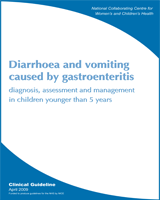Excerpt
When young children suddenly experience the onset of diarrhoea, with or without vomiting, infective gastroenteritis is by far the most common explanation. A range of enteric viruses, bacteria and protozoal pathogens may be responsible. Viral infections account for most cases in the developed world. Gastroenteritis is very common, with many infants and young children experiencing more than one episode in a year.
The symptoms of gastroenteritis are unpleasant and the illness has an impact on both child and family. Vomiting causes distress and anxiety. Diarrhoea is often accompanied by abdominal pain. Infants and young children with severe symptoms may quickly become dehydrated. Dehydration is a serious and potentially life-threatening condition.
The management of young children with gastroenteritis involves many considerations. Depending on the specific circumstances, care may be provided by parents or by a range of healthcare professionals. Children may be managed in a community or a hospital setting. There is debate and controversy regarding various aspects of clinical management. Clinical practice may have a major impact on the use of healthcare resources. Finally, there is evidence of considerable variation in practice in the management of children with gastroenteritis in the UK. It was for these reasons that this NICE clinical guideline on the ‘management of acute diarrhoea and vomiting due to gastroenteritis in children under 5′ was developed.
While every effort has been made to ensure the accuracy of the information contained within this publication, the publisher can give no guarantee for information about drug dosage and application thereof contained in this book. In every individual case the respective user must check current indications and accuracy by consulting other pharmaceutical literature and following the guidelines laid down by the manufacturers of specific products and the relevant authorities in the country in which they are practising.


